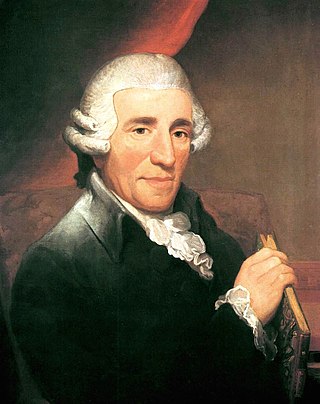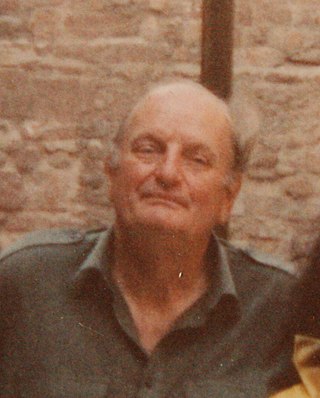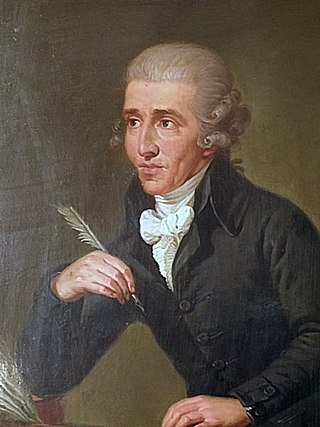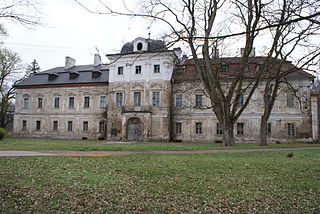Related Research Articles

Franz Joseph Haydn ; 31 March 1732 – 31 May 1809) was an Austrian composer of the Classical period. He was instrumental in the development of chamber music such as the string quartet and piano trio. His contributions to musical form have led him to be called "Father of the Symphony" and "Father of the String Quartet".
Johann Evangelist Haydn was a tenor singer of the classical era; the younger brother of the composers Joseph Haydn and Michael Haydn. He was often called "Hansl", a diminutive form of "Johann".

Symphony No. 22 in E♭ major, Hoboken I/22, is a symphony written by Joseph Haydn in 1764, under the auspices of the benign Prince Nikolaus Esterházy. Its nickname is "The Philosopher".

Howard Chandler Robbins Landon was an American musicologist, journalist, historian and broadcaster, best known for his work in rediscovering the huge body of neglected music by Haydn and in correcting misunderstandings about Mozart.

Johann Peter Salomon was a German violinist, composer, conductor and musical impresario. Although he was an accomplished violinist, he is best known for bringing Joseph Haydn to London and for conducting the symphonies that Haydn wrote during his stay in England. He also knew and worked with Wolfgang Amadeus Mozart and Ludwig van Beethoven.
C major is a major scale based on C, consisting of the pitches C, D, E, F, G, A, and B. C major is one of the most common keys used in music. Its key signature has no flats or sharps. Its relative minor is A minor and its parallel minor is C minor.

"Gott erhalte Franz den Kaiser" was a personal anthem to Francis II, Emperor of the Holy Roman Empire and later of the Austrian Empire, with lyrics by Lorenz Leopold Haschka (1749–1827) and music by Joseph Haydn. It is sometimes called the "Kaiserhymne". Haydn's tune has since been widely employed in other contexts: in works of classical music, in Christian hymns, in alma maters, and as the tune of the "Deutschlandlied", the national anthem of Germany.

The Seasons is a secular oratorio by Joseph Haydn, first performed in 1801.

Johann Baptist Wanhal was a Czech classical music composer. He was born in Nechanice, Bohemia, and died in Vienna. His music was well respected by Mozart, Haydn, Beethoven and Schubert. He was an instrumental performer as well. While being a proficient organist, he also played the violin and cello.
E-flat major is a major scale based on E♭, consisting of the pitches E♭, F, G, A♭, B♭, C, and D. Its key signature has three flats. Its relative minor is C minor, and its parallel minor is E♭ minor,.
D minor is a minor scale based on D, consisting of the pitches D, E, F, G, A, B♭, and C. Its key signature has one flat. Its relative major is F major and its parallel major is D major.

Eszterháza is a palace in Fertőd, Hungary, built by Prince Nikolaus Esterházy. Sometimes called the "Hungarian Versailles", it is Hungary's grandest Rococo edifice. It served as the home to Joseph Haydn and his orchestra from 1766 to 1790. In 2018, it was used as the shooting location for the Melanie Martinez film K-12.
Gregor Joseph Werner was an Austrian composer of the Baroque period, best known as the predecessor of Joseph Haydn as the Kapellmeister of the Hungarian Esterházy family. Few of Werner's works survive to the present day, and he is mostly remembered for his troubled relationship with Haydn.
Count Karl Joseph of Morzin (1717–1783) was a Bohemian aristocrat from the Morzin family, remembered today as the first person to employ the composer Joseph Haydn as his Kapellmeister, or music director. The first few of Haydn's many symphonies were written for the Count.

Joseph Haydn's Symphony No. 31 in D major, Hob. I/31, was composed in 1765 for Haydn's patron Nikolaus Esterházy. It is nicknamed the "Hornsignal Symphony", because it gives a prominent role to an unusually large horn section of four players. Probably because of its prominent obbligato writing for the horns, in Paris, the publisher Sieber published this symphony as a "symphonie concertante" around 1785.

The Autobiographical sketch (1776) of Joseph Haydn is the only autobiographical document that was ever prepared by this composer. Haydn wrote the sketch, which is about two pages long, when he was 44 at the request, relayed to him by a chain of two mutual acquaintances, of Ignaz de Luca, who was preparing a volume of brief biographies of Austrian luminaries, Das gelehrte Oesterreich. The sketch was published in 1778, in Volume 1, Part 3 of that work.
The Piano Sonata No. 15 in C major, Hob. XVI/15, is an arrangement for solo keyboard of the 1st, 3rd and 4th movements of the Divertimento in C by Joseph Haydn. This sonata is now considered spurious.

The Morzin Palace is a country estate in Dolní Lukavice, Czech Republic.

Philemon und Baucis, oder Jupiters Reise auf die Erde, Hob. XXIXb:2, is an opera in one act by Austrian composer Joseph Haydn to a German libretto, possibly by Prince Esterházy's librarian, Phillip Georg Bader. The text is based upon a play by G. K. Pfeffel, itself a retelling of the Baucis and Philemon myth from Ovid's Metamorphoses. The work is in the form of a Singspiel.
References
- Brook, Barry S. and Richard J. Viano (1997) Thematic Catalogues in Music: An Annotated Bibliography. Pendragon Press.
- Jones's web site